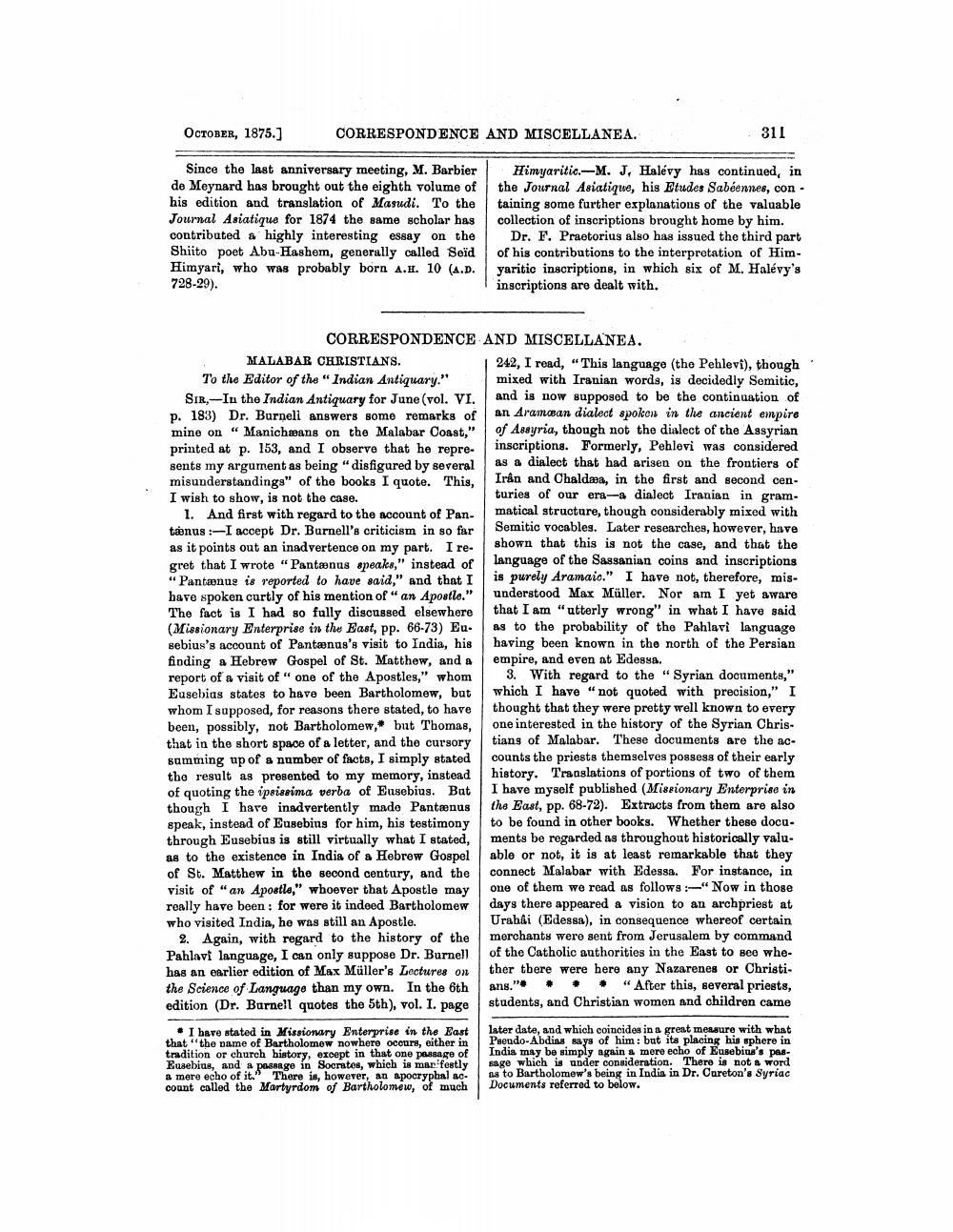________________
OCTOBER, 1875.]
CORRESPONDENCE AND MISCELLANEA.
311
Since the last anniversary meeting, M. Barbier de Meynard has brought out the eighth volume of his edition and translation of Masudi. To the Journal Asiatique for 1874 the same scholar has contributed a highly interesting essay on the Shiito poet Abu Hashem, generally called Seîd Himyari, who was probably born A.1. 10 (A.D. 728-29).
Himyaritic.-M. J, Halévy has continued, in the Journal Asiatique, his Etudes Sabéennes, con. taining some further explanations of the valuable collection of inscriptions brought home by him.
Dr. F. Praetorius also has issued the third part of his contributions to the interpretation of Himyaritic inscriptions, in which six of M. Halévy's inscriptions are dealt with.
CORRESPONDENCE AND MISCELLANEA. MALABAR CHRISTIANS.
242, I read, “This language (the Pehlevi), though. To the Editor of the Indian Antiquary." mixed with Iranian words, is decidedly Somitic, SIR.-In the Indian Antiquary for June (vol. VI. and is now supposed to be the continuation of p. 183) Dr. Burnell answers some remarks of an Aramoan dialect spoken in the ancient empire mine on "Manichæans on the Malabar Coast,"
of Assyria, though not the dialect of the Assyrian printed at p. 153, and I observe that he repre- inscriptions. Formerly, Pehlevi was considered sents my argument as being "disfigured by several
as a dialect that had arisen on the frontiers of misunderstandings" of the books I quote. This,
Iran and Chaldæa, in the first and second cenI wish to show, is not the case.
turies of our era- dialect Iranian in gram1. And first with regard to the account of Pan- matical structure, though considerably mixed with tanus :-I accept Dr. Burnell's criticism in so far
Semitic vocables. Later researches, however, have as it points out an inadvertence on my part. I re
shown that this is not the case, and that the gret that I wrote "Pantænus speaks," instead of language of the Sassanian coins and inscriptions "Pantænug is reported to have said," and that I is purely Aramaic." I have not, therefore, mishave spoken curtly of his mention of " an Apostlo."
understood Max Müller. Nor am I yet aware The fact is I had so fully discussed elsewhere that I am "utterly wrong" in what I have said (Missionary Enterprise in the East, pp. 66-73) Eu. as to the probability of the Pahlavi language Bebius's account of Pantænas's visit to India, his having been known in the north of the Persian finding a Hebrew Gospel of St. Matthew, and a empire, and even at Edessa, report of a visit of " one of the Apostles," whom 3. With regard to the "Syrian documents," Eusebius states to have been Bartholomew, but which I have not quoted with precision," I whom I supposed, for reasons there stated, to have thought that they were pretty well known to every boen, possibly, not Bartholomew, but Thomas, one interested in the history of the Syrian Christhat in the short space of a letter, and the cursory
tians of Malabar. These documents are the acBumming up of a number of facts, I simply stated counts the priests themselves possess of their early tho result as presented to my memory, instead history. Translations of portions of two of them of quoting the ipsissima verba of Eusebius. Bat I have myself published (Missionary Enterprise in though I have inadvertently made Pantænus the East, pp. 68-72). Extracts from them are also speak, instead of Eusebins for him, his testimony to be found in other books. Whether these docu. through Eusebius is still virtually what I stated, ments be regarded as throughout historically valu. as to the existence in India of a Hebrew Gospel able or not, it is at least remarkable that they of St. Matthew in the second century, and the connect Malabar with Edessa. For instance, in visit of "an Apostle," whoever that Apostle may one of them we read as follows:"Now in those really have been: for were it indeed Bartholomew days there appeared a vision to an archpriest at who visited India, he was still an Apostle.
Urahải (Edessa), in consequence whereof certain 2. Again, with regard to the history of the merchants were sent from Jerusalem by command Pahlavt language, I can only suppose Dr. Burnell of the Catholic authorities in the East to see whehas an earlier edition of Max Müller's Lectures on ther there were here any Nazarenes or Christi. the Science of Language than my own. In the 6th ans.". . . . “After this, several priests, edition (Dr. Burnell quotes the 5th), vol. I. page students, and Christian women and children came
• I have stated in Missionary Enterprise in the East that "the name of Bartholomew nowhere occurs, either in tradition or church history, except in that one passage of Eusebius, and a passage in Socrates, which is mar festly & mere echo of it. There is, however, an apocryphal account called the Martyrdom of Bartholomew, of much
later date, and which coincides in a great measure with what Pseudo-Abdias says of him: but its placing his sphere in India may be simply again a mere echo of Eusebius's pas. in.ge which is under consideration. There is not word as to Bartholomew's being in India in Dr. Oureton's Syriac Documents referred to below.
pas
red to below India in Dhere to hot




